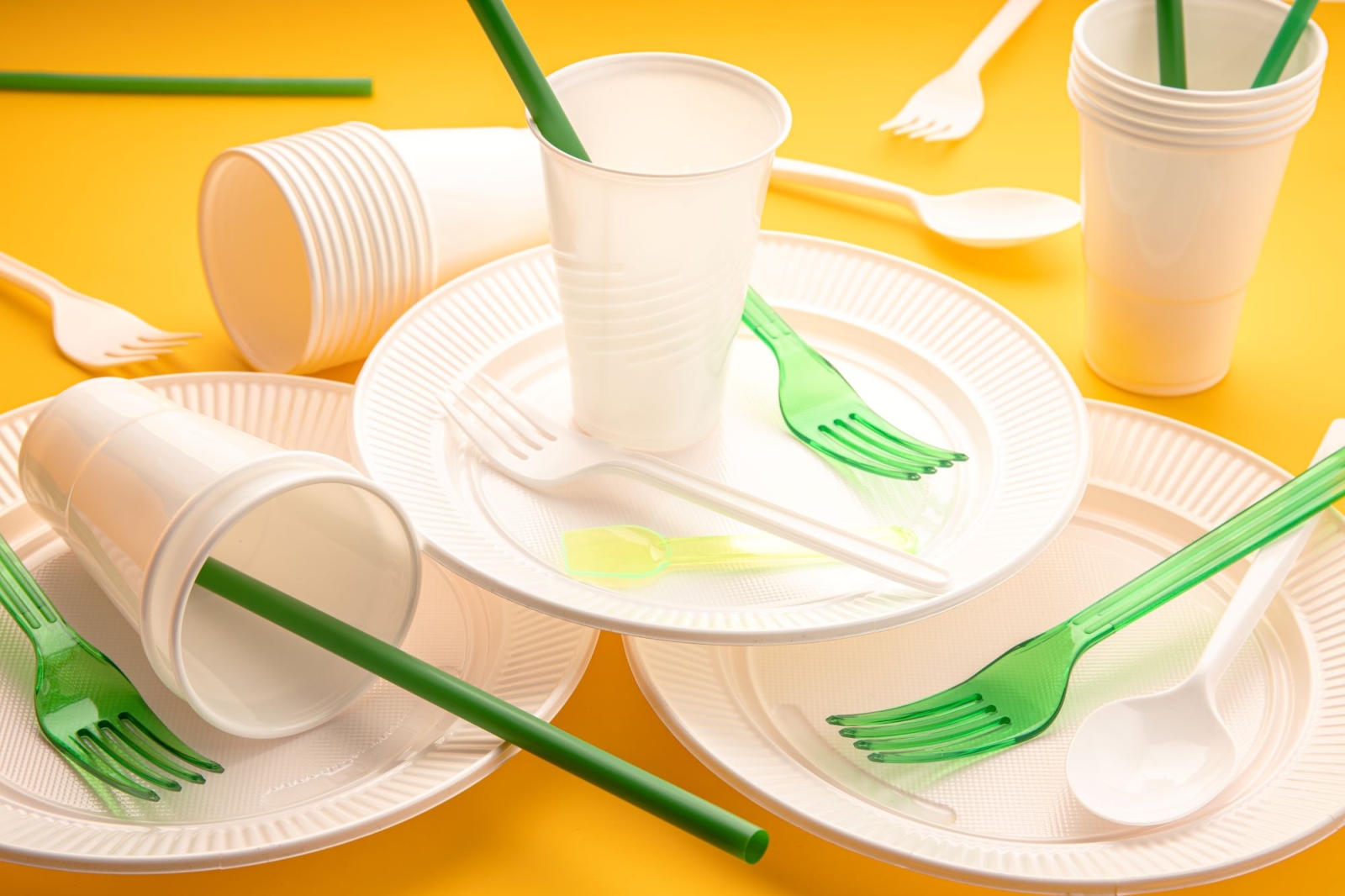This is the second article of the three-part series Bioplastic: green innovation or another plastic problem? an international investigation jointly published by Renewable Matter ‒ along with Eu Observer, LRT Lithuanian National Television, and TAZ ‒ through the support of Journalismfund Europe. The previous article is available at this link. The following part will be published in Renewable Matter in the coming weeks.
The first supermarket chain to ban disposable plastic tableware was Lidl Italia. It was the summer of 2019 and from that moment on, plates, cutlery and straws made of biodegradable and compostable plastic would begin to fill the shelves of Italian supermarkets. The packaging industry was looking for a more sustainable alternative to traditional plastic and disposable bioplastic tableware emerged as the perfect answer. Driven by demand from consumers and municipal administrations, there was a boom in sales which would later spread to mass market retailers.
On June 5th, 2019, the same day Assobioplastiche (the Italian Bioplastics Association) presented data showing a clear growth in the sector (+26% turnover in the previous year), the European Commission approved the Single Use Plastic directive (SUP) aimed at banning the trade of single-use plastic products whose dispersion is considered a serious threat to marine ecosystems. The list of banned products includes cotton buds, plates, cutlery, straws and other items which overall represent around 50% of the waste found on European beaches.
Finding out that biodegradable and compostable tableware, like traditional plastics, would also fall under the ban was a hard blow for Assobioplastiche. The reasoning, the European Commission specifies in a note, is that there is no guarantee that these products are properly biodegradable in the marine environment, as it is not certain that bioplastics decompose in water in a short timeframe and without causing harm to the environment. The ban is therefore aimed at every type of polymer and is conceived to prevent plastic pollution from littering.
Despite the recommendations from Brussels, in 2021 the Italian Government led by then Prime Minister Mario Draghi adopted the SUP with a derogation on bioplastics, an exemption designed to protect the industry’s interests rather than the environment.
The misleading biodegradability of bioplastic tableware
The word "biodegradable" on a product or packaging does not mean that we are free to disperse it into the environment hoping that it will "magically dissolve". A study published in May 2023 by the research centre Scripps Institution of Oceanography at UC San Diego tested the biodegradability in nature of a sample of PLA fabric, one of the biopolymers most commonly used to make disposable products and packaging. After approximately 428 days at sea, the PLA was found still intact, just like polypropylene and PET polymers. Research co-author Sarah-Jeanne Royer said, “This study demonstrates the need to standardise testing to understand whether materials marketed as compostable or biodegradable actually degrade in a natural environment.”
The European Union recommends never using "biodegradable" as a claim for products or packaging that might be littered. Yet in Italy numerous brands openly market plates, straws and cutlery as "biodegradable", without specifying the conditions, place and timeframe in which biodegradation should occur. As the European Commission reminds us, this type of communication might confuse consumers or, worse, encourage them to dispose of this type of waste in the environment.
Indeed it is not always easy to understand the true meaning of environmental labels. For instance, a recent survey by the Advertising Standards Authority ‒ the body that regulates advertising in the United Kingdom – shows how interviewees usually confuse the terms "compostable" and "biodegradable". “There is a strong belief that the word 'biodegradable' is unclear, others argue that it should not be used at all,” the report reads.
Marco Versari, president of Biorepack, the national consortium for the organic recycling of compostable plastic packaging, told Renewable Matter, “The Italian bioplastics industry has never mentioned biodegradability, but only compostability.” Compostability refers to the ability of an organic material to be transformed into compost, an organic mixture often used as a plant fertiliser. This process takes place only in special composting facilities and under controlled conditions. “Bioplastics are allowed on the Italian market because for years we have been able to rely on an excellent organic waste collection system,” Versari added.
Italy can, in fact, boast a successful track record in organic waste recycling. However, while national regulations mandated organic waste collection as of January 1st, 2022, only slightly more than 50% of the population in Southern Italy has access to this service. This number drops to 30% on the islands.
In 2022, the recycling rate of bioplastic packaging (including tableware) reached 60.7% of the amount on the market. Where does the remaining 40% of compostable packaging go? Possible answers include landfill disposal and incineration. If dispersed into the environment, however, bioplastic packaging and products -- just like traditional plastic -- contribute to pollution from littering, which is precisely what regulators in Brussels would like to address through the SUP directive.
Italy faces infringement proceedings
While not complying to the European directive on single-use plastics, the Italian Government has established requirements for the use of bioplastics. For example, products such as compostable tableware are only allowed where it is not possible to opt for reusable alternatives, a condition that leaves room for wide interpretation depending on where the consumption occurs. Compostable products are also allowed when the environmental impact of the reusable alternative is considered higher than that of disposable compostable products, which was one of the topics at the centre of the debate on the Packaging Regulation. Lastly, compostable tableware’s use is allowed when an effective closed loop collection system is implemented. This is often the case for cafeterias and catering services, but less common in many municipalities of Southern Italy.
A spokesperson for the European Commission explained to Renewable Matter that, at the moment, the executive body has limited its intervention to a warning to those 9 member states that have not yet adopted the directive: Belgium, Croatia, Estonia, Ireland, Latvia, Poland, Portugal, Slovenia and Finland. Only at a later stage will the correct transposition by the other States be assessed. In case of late or incorrect implementation, as it is the case for Italy, countries can be sanctioned through an infringement procedure. Between 2012 and 2021, Rome had to pay out over 800 million euros for failing to adapt its system to European laws, with most of the infringements concerning the environmental sector.
Between investments in research and bans, it’s chaos in Brussels
The Italian bioplastics industry sees compostable disposable items as an excellent opportunity to feed the country's 356 organic recycling plants. Following the widespread success of compostable shopping bags, widely used to collect domestic organic waste, the sector has bet on and invested in similar products, also thanks to European research funds. “Over the years, the European Union has supported various research projects with almost one billion euros to encourage the development of this industry. For this reason I would have expected more attention from Brussels", Versari lamented.
It is no coincidence that on December 12 th 2023, at the annual conference of the European Bioplastic Association in Berlin, Silvia Maltagliati of the Research and Development department of the European Commission was inundated with questions such as: "When can we expect more favourable laws after all the studies funded in the past years?". In fact, legislation and research funds seem to travel on different tracks.
The same year in which the Single Use Plastic bans came into force (2021), the Circular Bio-based Europe Joint Undertaking (CBE JU) was born, a 3.7 billion euro partnership between the European Union and the consortium of bio-based industries (BIC). The initiative aims to develop bio-based products and materials, i.e. derived from renewable raw materials or agricultural waste.
Some of the 22 research projects on packaging supported by the Horizon 2020 programme concern disposable bioplastics. For instance, almost 5 million euros have been allocated to HICCUPS, an initiative that aims to produce a biopolymer by capturing carbon dioxide emissions from wastewater treatment plants. Possible applications include cups, takeaway food packaging and plates and cutlery. A project by the name PEFeference has been trying since 2017 to replicate the characteristics of PET, commonly used in bottles, with a bioplastic derived from sugar cane. So far the project costs amount to almost 25 million euros.
In short, on the one hand Brussels tries to limit the disposable culture by banning some products and promoting reuse, on the other hand it invests millions of euros in research and innovation in the disposable sector, where bans and regulations like packaging restrictions, however, limit the industry's ability to fully capitalise on research advancements."
The “reusable” plates that elude the SUP
While in Italy the SUP effect has accelerated the spread of bioplastics, in other European countries paper plates, wooden and bamboo cutlery are proliferating, still fueling a less than circular disposable culture. In Belgium, France and Spain plates made of a slightly thicker plastic are sold as reusable and washable. This technical gimmick, also reported in Italy, is a way to get round the law and offer products that are still disposable at a more competitive cost compared to other materials. To understand to what extent these plates were truly reusable, in 2021 some volunteers from the Rethink Plastic Alliance association tested their resistance in the dishwasher, discovering that after just a few washes the plastic started to break and become contaminated with food.
Between ploys, national exemptions and misleading operations bordering on green marketing, today the European Union has the arduous task of making the SUP directive more coherent and cohesive. At least until 2027, when it will be discussed again in light of new potential biodegradability standards for bioplastics. To navigate this chaos, European consumers need greater transparency and clarity on the products they buy. Especially in the disposable sector, flooded with claims such as "bio", "eco" and "green", which is where greenwashing strategies most easily lurk.
Journalists Daiva Repeckaite and Jelena Malkowski contributed to this investigation
This article is also available in Italian / Questo articolo è disponibile anche in italiano
Cover image: Envato
© all rights reserved



